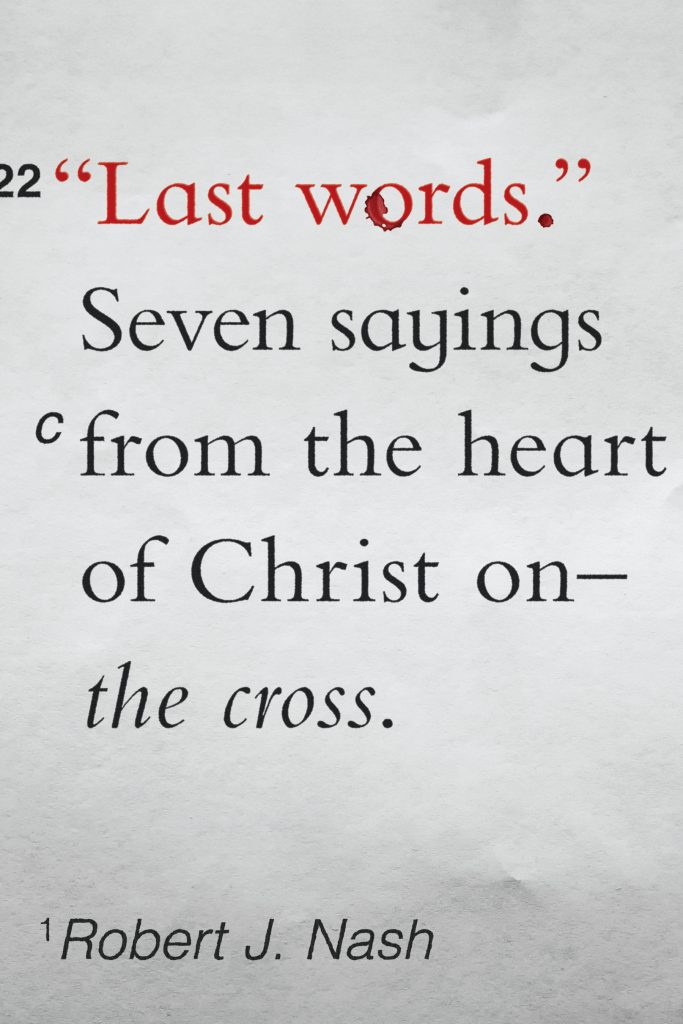I thirst.
John 19:28
We have seen how Jesus was thinking of others as he died, yet he suffered greatly. Innocently, he bore the weight of the world’s sin, dying the death of a criminal. In his fifth saying on the cross, he said, “I thirst” (John 19:28). What significance can we unearth from a simple, two-word statement?
We all need water. It makes up about sixty percent of our bodies. We can only live so long without it. It is a building block of life, including Jesus’s life here on earth. We are thirsty people. In his two words, “I thirst,” he expressed his humanity. He was fully one of us. Those two words connect us to him.
The perfect God became completely, simultaneously, and incomprehensibly God and man in one person. Born of Mary, he nursed in infancy. Weaned, he quenched his thirst with water from the promised land. The land flowing with milk and honey sustained him. Luke 2:40 says, he “grew and became strong, filled with wisdom.” We don’t know much about the details of his childhood or young adulthood, but we see his life began like it ended, with thirst. He was fully one of us. His humanity was essential. Why? The answer is connected to his purpose, seen in his ministry.
Satisfying the Soul’s Thirst
Let me ask you this: “What do you thirst after?” You and I hunger and thirst for food and drink, sure. But what else do you thirst after? Do you long for someone to understand you? Do you seek meaning and purpose? Do you desire friendship and companion- ship? Do you want answers, help, comfort, security, safety, control, happiness, pleasure, or ease? You and I seek so many things, don’t we? Sometimes we find satisfaction, but any satisfaction we experience is fleeting. The friend moves away. Our healthy family is disrupted by a sudden diagnosis. The children who are doing so well socially start straying and making decisions we know are going to result in heartache. We see sin’s effects all around, from droughts to floods, from pollution to contamination, from hurt to rebellion resident in our souls, so that all of creation “waits with eager longing for the revealing of the sons of God” (Romans 8:19). Meanwhile, we all thirst.
Jesus began his ministry quenching thirst. His first miracle was at a party foreshadowing the result of the cross by literally satisfying thirsts. He transformed one hundred and fifty gallons of wash water into fine wine after a host’s embarrassment of running out at the wedding at Cana. That miracle made a statement. It was celebratory. It was an announcement of another wedding approaching: God and man were united in one person, Jesus, and through his life, death, and resurrection he would purchase another union—the union of God and his church. This drink symbolized the overflow of grace Jesus would extend to the world, you, and me. The party guests at Cana were thirsty and Jesus satisfied them. He cared about thirst.
He cared about satisfying the thirst of the poor. He taught that whoever gives a cup of cold water to the least significant person, in his name, was giving it to him (Matthew 25:40). He cared about the marginalized and those on the fringe. He knew people’s physical needs and met them time and time again. He shared, listened, encouraged, defended, and loved the outcast. He gave the disciples a mission to emulate: Jesus cared for the physical thirsts.
He cared about the spiritual as well as the physical. In arguably the greatest message ever given, the Sermon on the Mount, Jesus taught that whoever hungers and thirsts after righteous- ness will be satisfied (Matthew 5:6). How? On our own, we don’t have rightness and purity before God. So how can we quench the thirst of our souls?
Jesus cried out the answer to that question at the Feast of Tabernacles: “If anyone thirsts, let him come to me and drink. Whoever believes in me, as the Scripture has said, ‘Out of his heart will flow rivers of living water’” (John 7:37–38). Jesus satisfies the soul’s thirst. We need only to believe in him, to come to him, to quench our thirst.
Water that Lasts
Another time Jesus spoke of satisfying thirst was as he passed a well in Samaria, north of Jerusalem. He was thirsty. A Samaritan woman was gathering water. She was thirsty too. In those days, men often did not talk to women, and Jewish men certainly didn’t talk to Samaritans. However, Jesus looked past cultural taboos, sordid skeletons, and theological errors. He saw her. He saw her soul’s thirst. He approached and made a simple request for a drink of water.
The Samaritan woman said to him, “How is it that you, a Jew, ask for a drink from me, a woman of Samaria?” (For Jews have no dealings with Samaritans.) Jesus answered her, “If you knew the gift of God, and who it is that is saying to you, ‘Give me a drink,’ you would have asked him, and he would have given you living water.” The woman said to him, “Sir, you have nothing to draw water with, and the well is deep. Where do you get that living water? Are you greater than our father Jacob? He gave us the well and drank from it himself, as did his sons and his livestock.”
Jesus said to her, “Everyone who drinks of this water will be thirsty again, but whoever drinks of the water that I will give him will never be thirsty again. The water that I will give him will become in him a spring of water welling up to eternal life.”
John 4:9–14
Jesus was offering this woman what he offered the crowd at the feast. He was offering to satisfy the soul’s thirst forever. This is so satisfying that it will result in eternal life. Water sustains an earthly life; Jesus offers life forever. He is better than the fountain of youth; he is the fountain of eternal life.
How could he offer water that quenches thirst eternally? He answered that speaking to his disciples at the Last Supper. Jesus connected the Passover wine to his blood that he would shed hours later for the forgiveness of sin. His blood accomplished what he promised the crowd, the Samaritan woman, and the disciples. No other blood could do what Jesus’s blood could.
He embraced his death as well as thirst. He was making a great exchange: one human for other humans, perfect for imperfect. Hebrews gives us an answer to why he thirsted: “Therefore he had to be made like his brothers in every respect, so that he might become a merciful and faithful high priest in the service of God, to make propitiation for the sins of the people” (Hebrews 2:17). Jesus was made like us in every respect. He thirsted as we thirst. He was human, yet perfect. He was merciful and faithful when we have not been. He was the great High Priest and at the same time the perfect sacrifice. He made propitiation: he took God’s wrath on our behalf. Jesus’s thirst flows from his humanity, and his humanity was essential for this exchange. He took our place. He was our substitute.
Jesus’s thirst shows who he is, what we need, and how he met that need two thousand years ago. The dry cotton mouth sensation of dehydration was real. God truly became man with all his hunger and thirst that we might truly be united with him. He embraced humanity that we might enjoy the divinity eternally.
Isaiah the prophet predicted this. He gave an invitation from God that you and I can enjoy today, right now. We can come to Jesus and find a satisfaction for our thirst just like Jesus’s disciples, the Samaritan woman, and the crowd at the feast. Isaiah says to you,
“Come, everyone who thirsts,
come to the waters;and he who has no money,
come, buy and eat!Come, buy wine and milk
without money and without price.Why do you spend your money for that which is not bread,
and your labor for that which does not satisfy?Listen diligently to me, and eat what is good,
and delight yourselves in rich food.Incline your ear, and come to me;
Isaiah 55:1–3
hear, that your soul may live.”
Reflection
Do you thirst? Do you thirst for God? Do you long for forgive- ness? Do you hunger for love and acceptance, peace and provision? Find your soul’s satisfaction in God. Come to him and buy his wine and milk without price—at least without price to you. Good Friday was excruciating because we see a thirsty man die a horrendous death. However, Good Friday is good because you and I see our substitute. His tacky mouth is just one expression of his care for you. He understands you because he was like you in every respect. Take his offer, and satisfy your thirst in him today.
Excerpted from Last Words: Seven Saying from the Heart of Christ on the Cross © 2020 by Robert J. Nash. May not be reproduced without prior written permission.






